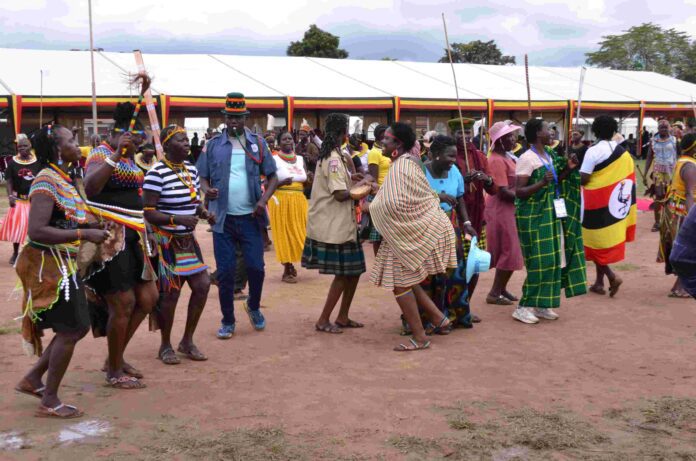
Hundreds of delegates who turned up for the 2024 Ateker Festival in Soroti City were on Thursday, November 28th, 2024, treated to various traditional songs and dancing activities.
The festival that was opened on Wednesday, November 27th, by President Yoweri Kaguta Museveni at the Soroti Boma grounds is being celebrated under the theme: Celebrating Shared Heritage, Forging a Path Toward Peace, Prosperity, and Cultural Renaissance.
The second day of the Ateker festival was largely marred with different traditional songs and dance performances from various tribes.
Sarah Lokong, a Karimojong by tribe and also a local musician from Moroto municipality, while performing a song titled Tobongu Lore (come back home),” preached about peace and reconciliation among the Ateker community to ensure social co-existence with other tribes.
“Tobongu Lore is a song about using the Ateker group; now that we have come back together, let us unite and teach our brothers the Karimojong to stop rustling livestock and embrace peace,” said Lokong.
After her stage performance, Lokong, while explaining the meaning of her song… Tobongu Lore and Ayieni Ngikonirwa (God knows the end of your 40 days) asked other tribes in the region to forgive the people of Karamoja over the atrocities committed by the warriors.
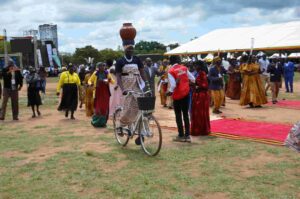
“I apologize to my people from Teso, Lango Abim, Acholi, and Turkana for the massive killings and rustling caused by our people over the years,” Lokong said before sending the crowd into a moment of silence.
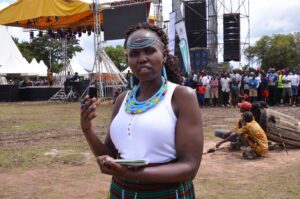
A cultural group from Lango also performed a traditional song titled “Kiri” and used it to preach for peace and reconciliation.
Bosco Olung, a renowned businessman from Lango who participated in the performance, said the song emphasizes togetherness in the community.
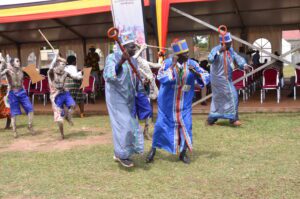
Several Ateso cultural groups performed a series of traditional songs and dances, including Akongo and Ajosi, that are often staged during celebrations to depict unity and peace among the community.
On Wednesday, while delivering a speech during the launch of the 2024 Ateker Festival, the traditional leader of Teso, the Emorimor, Paul Sande Emolot, urged for peace and unity among the community.
“I urge the Ateker people to look beyond divisions and embrace our shared humanity. Let us remember that we are one family, bound by history and destiny. The conflicts we face are challenges to overcome, not reasons to divide. As I stand before you, I see a future where the Ateker community thrives in unity—where our shared heritage is celebrated, our resources are shared responsibly, and our youth inherit a legacy of peace and prosperity,” said the Emorimor.
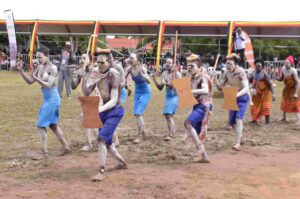
The Ateker cluster includes the following tribes: Bako, vDima, Iteso, Jie, Kakwa, Kalenjin, Karamojong, and Karo, who include the Kakwa, Kumam, Lango, Maasai, Nyangatom, Samburu,Toposa, and Turkana.
The Ateker community is bound by history, culture, and kinship spread across Africa, including the Democratic Republic of Congo, Ethiopia, Kenya, South Sudan, Tanzania, and Uganda.
“We are cattle keepers whose livelihoods are intertwined with the land, water, and traditions that have sustained us for generations. However, alongside this rich heritage, we face challenges that threaten the harmony of our communities,” said Sande Emolot.
He said’ “Together, we can build this future. Let us leave this festival with a renewed commitment to peaceful coexistence, cooperation, and development. Let us honor the legacy of our ancestors by forging a path that secures the dignity and well-being of generations to come.”
The festival will end on November 29th, 2024.














